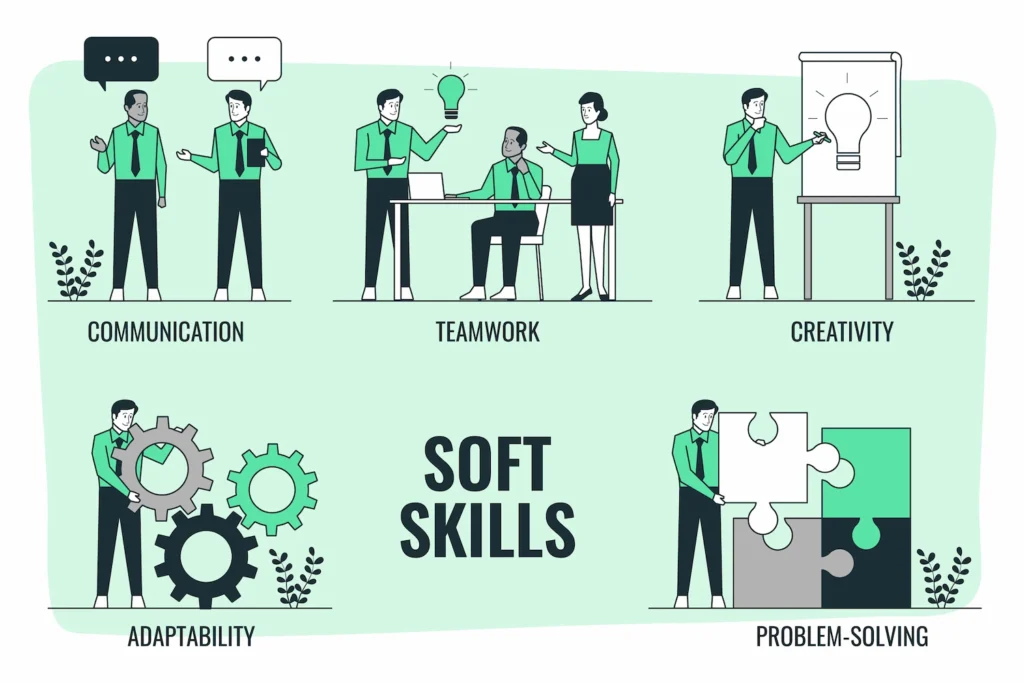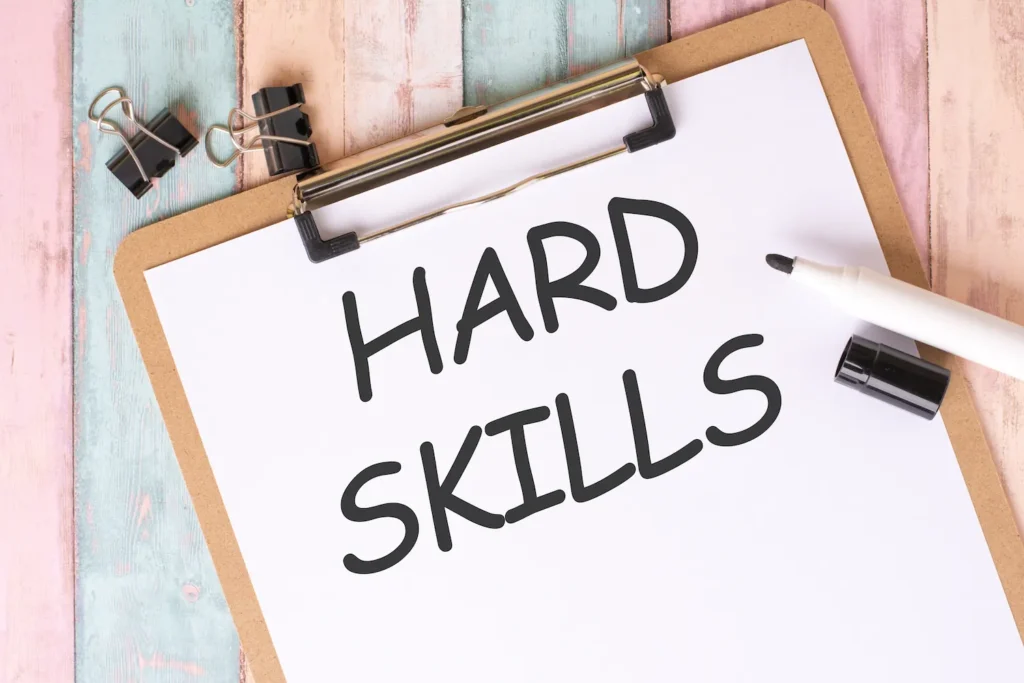Hard Skills vs. Soft Skills: What’s the Difference?
Skills are the currency of success in both personal and professional domains. In today’s fast-paced world, employers and individuals alike seek a blend of competencies to navigate challenges and achieve goals. But not all skills are created equal. The debate between hard skills and soft skills often arises when considering what’s more important. While hard skills are task-specific, measurable abilities, soft skills relate to interpersonal and emotional intelligence. Together, they form the backbone of a well-rounded skill set.
This article delves into the definitions, examples, and ways to develop both hard and soft skills while highlighting their differences and how they complement each other.
What Are Soft Skills?
Soft skills are the intangible abilities that influence how you interact with others and manage situations. Unlike hard skills, which are teachable and measurable, soft skills revolve around personality traits and behaviors. These skills often determine how effectively you communicate, collaborate, and adapt to new environments.
Soft skills are particularly crucial in team settings, leadership roles, and customer-facing positions. They bridge the gap between technical expertise and effective execution, helping individuals succeed in dynamic, people-oriented scenarios.

Soft Skills Examples
Here are ten essential soft skills that are highly valued across industries:
1. Communication: Clear and effective exchange of ideas, both verbal and non-verbal.
2. Leadership: The ability to inspire and guide teams towards a shared goal.
3. Teamwork: Collaboration and cooperation to achieve collective success.
4. Adaptability: Flexibility to handle change and uncertainty.
5. Problem-solving: Analyzing situations to identify and implement effective solutions.
6. Time Management: Prioritizing tasks and managing schedules to meet deadlines.
7. Emotional Intelligence: Recognizing and managing your emotions while understanding others’ feelings.
8. Creativity: Generating innovative ideas and thinking outside the box.
9. Conflict Resolution: Addressing disagreements constructively to find common ground.
10. Work Ethic: Demonstrating dedication, reliability, and responsibility.
These skills often form the foundation of a successful career, especially in roles that involve significant human interaction.
What Are Hard Skills?
Hard skills are the technical abilities and knowledge required to perform specific tasks or jobs. These are measurable, teachable, and often certified through training or education. Hard skills are typically job-specific and can be evaluated through tests, assignments, or portfolios.
Unlike soft skills, hard skills are objective and quantifiable. Whether it’s coding, accounting, or graphic design, hard skills form the technical backbone of most professions. Employers often look for these competencies to ensure candidates have the required expertise for a given role.

Hard Skills Examples
Below are ten common hard skills valued by employers:
1. Data Analysis: Proficiency in analyzing data to make informed decisions.
2. Programming: Writing and understanding code in languages like Python, Java, or C++.
3. Foreign Language Proficiency: Speaking, reading, and writing in additional languages.
4. Writing and Editing: Crafting compelling content for various platforms.
5. Graphic Design: Creating visual content using tools like Adobe Illustrator or Canva.
6. Accounting: Managing financial records and preparing budgets.
7. Project Management: Planning, executing, and overseeing projects effectively.
8. Technical Certifications: Specialized skills like AWS Cloud Computing or PMP certification.
9. Digital Marketing: Expertise in SEO, content marketing, and social media strategies.
10. Public Speaking: Delivering impactful speeches or presentations.
These skills are critical for landing technical roles and advancing in your career.
How to Develop Skills
Both hard and soft skills can be cultivated through consistent effort and practice. Here’s how:
• For Soft Skills: Engage in activities like public speaking, teamwork exercises, or conflict resolution training. Reading self-help books and seeking feedback can also aid growth.
• For Hard Skills: Enroll in online courses, attend workshops, and gain certifications in areas relevant to your career. Practice regularly to refine these abilities.
How to Showcase Your Hard and Soft Skills
Highlighting your skills effectively is key to standing out in the job market. Follow these tips:
• Resume: Include both hard and soft skills in your skills section. Tailor them to the job description.
• Interviews: Use examples to demonstrate how your skills have contributed to past successes.
• LinkedIn: Showcase your skills through endorsements, posts, and portfolio links.
Developing Your Project Management Skills
Project management is a highly sought-after skill in today’s workforce, encompassing a blend of hard and soft skills. Excelling in this area means being able to lead teams, manage resources, and deliver results within deadlines and budgets. Here’s a closer look at how to develop project management skills.
Hard Skills for Project Management
1. Technical Proficiency: Master project management tools like Peerbie, Asana, Trello, Microsoft Project, or Jira. These platforms help streamline task delegation, monitor progress, and ensure timely delivery.
2. Budgeting and Cost Management: Learn how to create and manage budgets effectively to avoid overspending. Tools like Excel or QuickBooks can help.
3. Risk Management: Understand techniques to identify potential risks and develop strategies to mitigate them.
4. Scheduling: Familiarize yourself with methodologies like Gantt charts, Agile, and Scrum to plan project timelines effectively.
Soft Skills for Project Management
1. Leadership: Inspire and guide your team towards achieving project objectives. Leadership involves setting clear expectations, fostering collaboration, and addressing challenges.
2. Communication: A project manager needs to act as a bridge between stakeholders and team members, ensuring everyone is on the same page. Practice active listening and clear articulation to improve this skill.
3. Problem-Solving: Be ready to address unexpected hurdles. This requires a calm, analytical mindset and the ability to think on your feet.
4. Time Management: Managing deadlines while ensuring quality is a critical aspect of project management. Learn to prioritize tasks and delegate when necessary.
Practical Tips to Develop These Skills
• Education and Certifications: Enroll in project management courses or earn certifications like PMP (Project Management Professional) or PRINCE2. These credentials demonstrate your expertise and commitment.
• Real-World Practice: Volunteer to lead small projects at work or within community organizations. Real-world experience is invaluable for refining your skills.
• Seek Feedback: Ask for constructive criticism from team members or mentors to identify areas for improvement.
• Leverage Technology: Use modern tools and software to streamline your work processes and enhance efficiency.
By combining technical know-how with interpersonal finesse, you can excel in project management and drive successful outcomes for your team or organization.
The Difference Between Hard Skills and Soft Skills
Hard skills and soft skills are like two sides of the same coin. Both are critical for professional success, but they serve different purposes and are developed in distinct ways. Let’s dive deeper into their differences to understand why balancing them is key.
Definition and Nature
• Hard Skills: These are teachable, technical abilities that are often specific to a job or industry. They are objective, meaning they can be measured and assessed through tests, certifications, or job performance. For example, coding in Python, proficiency in Excel, or fluency in a foreign language are all hard skills. They can usually be acquired through formal education, training programs, or hands-on experience.
• Soft Skills: On the other hand, soft skills are interpersonal and behavioral traits that influence how you interact with others and handle work situations. They are more subjective and harder to quantify, as they often depend on personality, emotional intelligence, and life experience. Examples include communication, leadership, and problem-solving.
Acquisition and Development
• Hard skills require deliberate learning, such as taking a course, attending workshops, or earning certifications. For instance, you might learn web development by completing an online course and showcasing your projects. These skills are often job-specific and have a clear learning path.
• Soft skills, however, are developed over time through experience, feedback, and personal growth. For example, teamwork can be honed by working on group projects, and emotional intelligence can be improved by learning to empathize with others.
Relevance in the Workplace
In the professional world, hard skills demonstrate your ability to perform specific tasks or technical duties. For instance, an accountant must know how to use accounting software, while a designer needs to master tools like Adobe Photoshop. These skills are often listed on job descriptions as minimum qualifications.
Soft skills, meanwhile, determine how effectively you can work with others, adapt to challenges, and contribute to a positive workplace culture. Imagine a manager who is excellent at creating budgets but struggles to motivate their team. Without soft skills, even the most talented individual may find it hard to thrive.
Examples in Practice
Let’s compare scenarios to highlight the difference:
• Hard Skill Example: A data analyst uses statistical tools like R or Python to analyze company data and present findings. Their ability to manipulate datasets is a technical skill that requires specific training.
• Soft Skill Example: The same analyst communicates their findings to a non-technical team. Their ability to translate complex data into simple insights reflects communication skills, a soft skill.
How They Complement Each Other
Neither hard nor soft skills alone can guarantee success. The two work hand in hand to create a balanced professional profile. For example:
• A software developer with excellent programming skills (hard skill) but poor teamwork abilities (soft skill) may struggle in a collaborative project.
• Conversely, someone with strong interpersonal skills but no technical knowledge may find it challenging to contribute to a specialized role.
Employers value candidates who can bring both to the table, as this balance ensures competence and adaptability.
Understanding the distinction between hard and soft skills is crucial for personal and professional development. Both types of skills play a vital role in building a successful career. By identifying your strengths and working on areas of improvement, you can create a well-rounded skill set that opens doors to endless opportunities.

